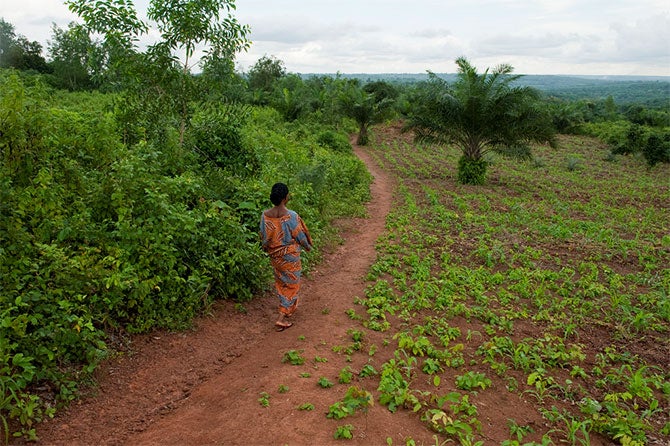
Following a long tradition of economists, the newly-elected government in Benin can gain inspiration from geography. For economist Jeffrey Sachs, university professor at New York’s Columbia University, many tropical countries have failed to grow because their hot climate facilitated the propagation of epidemic diseases. Economist Paul Collier, professor of economics and public policy in the Blavatnik School of Government at the University of Oxfod, has argued that Sub-Saharan Africa (SSA) is lagging because of its disproportionate number of people living far from the ocean and thus from global markets. Similarly, French historian Fernand Braudel’s work reminds us that many urban centers only became “true” drivers of growth when they were able to host processing industries, which are usually absent in Africa.
These lessons point to at least three priorities for Benin. First, the country can build its future by taking greater advantage of its geographic proximity to Nigeria and its access to the ocean through the port of Cotonou. Second, it can create productive cities by starting to process its abundant agriculture resources. And finally, it can help enhance its infrastructure and human capital by addressing the issues of coastal erosion and tropical diseases.
Getting the most from its proximity with Nigeria
For a small economy such as Benin, Nigeria’s proximity is a blessing. It provides access to 180 million customers, who can be connected to global markets through the port of Cotonou. To take advantage of this opportunity, Benin needs to perform better in terms of its human-made policies than its big neighbor.
To do better, Benin should start by offering a better environment for businesses. Switzerland, Finland and Singapore have all developed world class investment climates that are superior to their big neighbors. By contrast, Benin is only 158th in the most recent Doing Business ranking, barely above Nigeria (169th). Better access to electricity and water, as well as improved security conditions will also help to further attract firms looking to serve the Nigerian market.
Upgrading the efficiency of the port of Cotonou is critical as it is the main gateway to global markets. Such a move was a game changer in Singapore or Hong Kong. Unfortunately, Benin is ranked 109th by the World Bank’s logistical development index. If the new government could bring more competition and transparency to port management, there would be a plethora of interested investors, since ports have been very profitable businesses worldwide.
Transforming its natural resources for more jobs
The second priority for Benin should be to increasingly transform its natural resources, as a way to create new jobs for its rapidly growing labor force. The country is producing cotton in great quantity, accounting for typically 25% of its exports, but less than 5% of this production is processed in the country. There is only a handful of textile companies. Similarly, high quality cashew nuts production has been booming in recent years, but there is only one industrial processing company – a joint venture with Dutch investors. Potential exists in several other areas as well, with prime examples being fruit and juice processing, including mangoes and pineapple, as well as in wood products.
Transforming agricultural products is attractive for a low income country because it usually requires relatively little skilled labor and physical capital. What is needed is secure industrial land, with reliable access to electricity and water, as well as a good connection to input markets and the port. The focus of the Government should therefore be on these basic conditions, perhaps by developing industrial estates as has been done in East Asia and more recently in Ethiopia or Rwanda. The reward would be the creation of many needed jobs.
Managing coastal erosion and malaria
The third priority should be to take care of coastal erosion and malaria. Global warming has had, and will continue to have, disastrous consequences for Benin, many of which are already visible. Higher ocean levels have, and will, destroy hundreds of houses, schools, and roads along the coast near Cotonou and Grand Popo. Greater effort, including by the global community, could help prevent further coastal erosion before it is too late.
Every year one million people in Benin are infected by malaria. Approximately 20% of deaths caused by health problems are due to this disease. The economic and social cost is huge for the country. If every infected person loses three days of work per year, this represents 1.5 million working days lost (assuming that half of the infected population is working). Yet, malaria can be fought and considerable progress can be made, as demonstrated by several South Asian countries in recent years.
Toward economic emergence
The combination of these three priorities allow us to visualize how Benin could transform itself in the future. If the government can improve the business environment and increase port efficiency, and given the country’s production of cotton and other agricultural products as well as the proximity to the Nigerian market, there is no reason that domestic, as well as Chinese or Indian investors, would not be attracted to Benin, creating many new job opportunities for local workers. Ethiopia and Rwanda have been successful in attracting these investors, perhaps with even fewer geographical assets than Benin. In addition, if the Government (and donors) could better manage the country’s coastal erosion and reduce the malarial burden, it is needless to say that the benefits would be even greater for the local population.


Join the Conversation